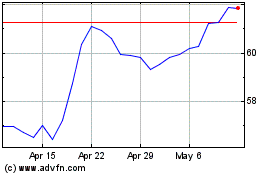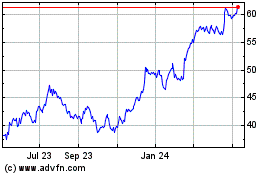Wells Fargo Fires Forex Bankers Amid Internal Investigation -- 2nd Update
October 20 2017 - 7:51PM
Dow Jones News
By Emily Glazer
Problems at Wells Fargo & Co., which continues to grapple
with the fallout from its sales-practices scandal, have extended to
its investment bank, prompting the firm to fire with cause four
foreign-exchange bankers, according to people familiar with the
matter.
The bank has launched an internal investigation and regulators
are also probing the foreign-exchange business, the people said.
The issue that led to the firings, along with the reassignment of a
senior executive, couldn't be fully determined. It involves one
specific transaction with a client, who has been notified by the
bank, according to a person familiar with the matter.
Until now, issues at the bank have centered on its
retail-banking operation. After agreeing a year ago to a regulatory
settlement over improper sales practices, the bank this summer
disclosed that a review of its businesses also had revealed
problems related to improperly charging customers for certain auto
insurance and mortgage products.
The issues in the foreign-exchange business emerged separately
from the review of business practices sparked by the
sales-practices scandal, according to one of the people familiar
with the matter. A Wells Fargo spokeswoman confirmed the departures
after inquiries from The Wall Street Journal.
Separately, the Office of the Comptroller of the Currency
earlier this week sent a confidential report to Wells Fargo about
the auto-insurance product issues, according to a person familiar
with that matter. The report said the bank may need to refund to
customers more than the $80 million the bank had previously cited,
the person said.
The foreign-exchange firings come just weeks after Wells Fargo
Chief Executive Timothy Sloan was castigated during a Senate
Banking Committee hearing for the bank's conduct and culture, such
as how the sales problems happened for many years and why more
wasn't done to stop them. Sen. Elizabeth Warren (D., Mass.) called
for wider-reaching change within the bank and for Mr. Sloan's
firing.
Mr. Sloan defended the bank and its handling of problems,
pointing to a number of changes he has made over the past year in
the operations of the retail-banking business. Mr. Sloan rose
through the ranks of Wells Fargo's wholesale and investment-banking
business, rather than the retail-banking side, a fact his
supporters have noted to rebut critics who have questioned whether
a 30-year veteran of the firm can bring about big changes.
Within the investment bank's foreign-exchange operation, those
fired, people familiar with the matter said, were Simon Fowles,
recently head of foreign exchange trading; Bob Gotelli, recently
head of foreign-exchange sales; Jed Guenther, recently a regional
head of foreign exchange; and Michael Schaufler, chief spot
dealer.
The bankers didn't respond to requests for comment or declined
to comment.
The prior head of the foreign exchange group, Sara
Wardell-Smith, was moved to a different role at the bank, the
people said. Ms. Wardell-Smith's LinkedIn profile refers to a role
beginning in October leading part of Wells Fargo's
financial-institutions group. She had held several roles in the
bank's foreign-exchange group after joining Wells Fargo in 1995 and
led the group for the past decade.
Ms. Wardell-Smith didn't respond to requests for comment.
The bank spokeswoman said Ms. Wardell-Smith accepted a new
position as Americas regional leader in Wells Fargo's
financial-institutions group.
The spokeswoman added that the bank's foreign-exchange business
"will continue to serve our clients under the leadership of Ben
Bonner."
Wells Fargo's investment-banking, securities and markets
division, known as Wells Fargo Securities, is a fraction of the
size of its U.S. big-bank peers. Its U.S. investment-banking market
share is just about 4% as of September, according to research firm
Dealogic.
And Wells Fargo's foreign-exchange desk doesn't do as much
business as other banks, industry participants have said. Wells
Fargo doesn't break out financial results or metrics for that
group.
Unlike many other big banks, Wells Fargo's foreign-exchange
operations weren't caught up in investigations into collusion
between market participants to move foreign-currency rates for
their own financial benefit. Those investigations led to more than
$5 billion in combined penalties at U.S. and European banks and a
guilty plea to criminal charges in recent years.
In regard to the retail-bank problems, the report sent to the
bank by the OCC this week said Wells Fargo was too slow to identify
and correct problems related to auto-insurance products known as
collateral protection insurance, the person familiar with the
matter said. The OCC report was first reported by the New York
Times.
The OCC did acknowledge that the bank has ended the
auto-insurance practices, changed management and restructured the
group responsible for the sales.
An OCC spokesman declined to comment on continuing supervisory
matters.
Another Wells Fargo spokeswoman reiterated that the bank
discontinued the product at issue.
"We will continue to work with regulators on the remediation and
will make improvements to our auto-lending business," the
spokeswoman said.
Write to Emily Glazer at emily.glazer@wsj.com
(END) Dow Jones Newswires
October 20, 2017 19:36 ET (23:36 GMT)
Copyright (c) 2017 Dow Jones & Company, Inc.
Wells Fargo (NYSE:WFC)
Historical Stock Chart
From Mar 2024 to Apr 2024

Wells Fargo (NYSE:WFC)
Historical Stock Chart
From Apr 2023 to Apr 2024
